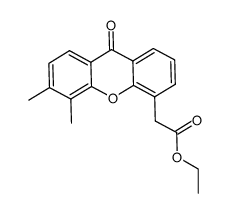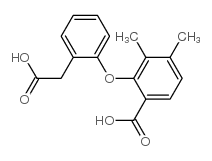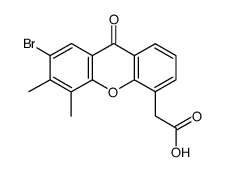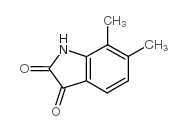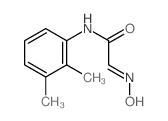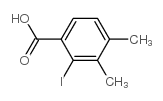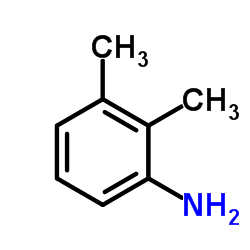117570-53-3
| 中文名 | 2,5-己酮可可碱 |
|---|---|
| 英文名 | vadimezan |
| 中文别名 |
5,6-二甲基-9-氧-9-氢-氧杂蒽-4-乙酸(DMXAA,ASA404)
5,6-二甲基-9H-氧杂蒽-9-酮-4-乙酸 5,6-二甲基吨酮-4-乙酸 5,6-二甲基呫吨酮-4-乙酸 |
| 英文别名 |
5,6-Dimethyl-9-oxo-9H-xanthene-4-acetic acid
5,6-dimethylxanthenoneacetic acid (5,6-Dimethyl-9-oxo-9H-xanthen-4-yl)acetic acid Vadimezan 2-(5,6-Dimethyl-9-oxo-9H-xanthen-4-yl)acetic acid 9H-Xanthene-4-acetic acid, 5,6-dimethyl-9-oxo- T C666 BO IVJ D1 E1 N1VQ ASA-404 DMXAA 5,6-Dimethylxanthenone-4-acetic acid |
| 描述 | Vadimezan (ASA-404; DMXAA) 是血管破坏剂,是鼠干扰素基因 (STING) 刺激物,也是I型IFN和其他细胞因子的强效诱导剂。 |
|---|---|
| 相关类别 | |
| 靶点 |
STING[1], type I IFNs[2] |
| 体外研究 | Vadimezan(DMXAA),血管破坏剂,是干扰素基因(STING)刺激物的鼠激动剂,也是I型IFN和其他细胞因子的有效诱导剂。 Vadimezan(DMXAA)对344SQ-ELuc细胞活力没有不利影响。发现Vadimezan介导的NF-κB途径的上调,如M2巨噬细胞中p65磷酸化的增加所示[1]。结果表明,与中等预处理的巨噬细胞相比,Vadimezan(DMXAA)处理的细胞在所有MOI中都免受VSV诱导的细胞毒性。 Vadimezan(DMXAA)有效抑制两种流感病毒的生长,证明了Vadimezan治疗人类流感耐药菌株的潜力[2]。 |
| 体内研究 | 344SQ-ELuc NSCLC皮下肿瘤对Vadimezan(DMXAA)有显着反应,药物注射后生物发光(BLI)信号明显减少。 Vadimezan(DMXAA)治疗344SQ-ELuc转移瘤不会降低光子发射率,在治疗后肿瘤在组织学上与对照组相似。与大皮下肿瘤一样,Vadimezan(DMXAA)对小皮下肿瘤小鼠给药仍然导致6和24小时光子发射减少~2-log [1]。在体内,Vadimezan(DMXAA)是更有效的IFN-βmRNA诱导剂和相对较差的TNF-αmRNA诱导剂。 Vadimezan(DMXAA)给药导致流感感染小鼠体重减轻明显减少[2]。 |
| 激酶实验 | 用20μg/ mL Vadimezan(ASA-404)或DMSO载体处理M2极化的巨噬细胞30分钟。然后裂解细胞并在SDS缓冲液中使蛋白质变性,并将样品送去进行RPPA分析。评估各种蛋白质的差异丰度和/或响应于Vadimezan(ASA-404)的磷酸化状态[1]。 |
| 细胞实验 | 培养RAW 264.7巨噬细胞并以1×10 5个细胞/孔接种在96孔板中。在37℃温育过夜后,用含有载体或Vadimezan(DMXAA)(100μg/ mL)的培养基处理细胞。 6小时后,用含有VSV的无血清DMEM以指定的MOI替换培养基1小时。然后将细胞维持在含有10%FBS的完全DMEM中。二十四小时后,用PBS洗涤细胞,用10%缓冲的福尔马林固定,并用蒸馏水彻底冲洗。贴壁细胞用结晶紫染色[2]。 |
| 动物实验 | 在该研究中使用雄性129 / Sv小鼠(6至12周龄)。为了产生皮下肿瘤,将100μLPBS中的5×105 344SQ-ELuc细胞注射到小鼠的两个后侧。通过BLI每2至4天监测肿瘤生长。一旦建立肿瘤(全身转移的第10天;皮下肿瘤的第7天或第14天),通过ip注射给予小鼠25mg / kg的Vadimezan(DMXAA)或DMSO载体。 BLI在6和24小时进行[1]。 |
| 参考文献 |
| 密度 | 1.3±0.1 g/cm3 |
|---|---|
| 沸点 | 520.9±50.0 °C at 760 mmHg |
| 熔点 | 264 °C |
| 分子式 | C17H14O4 |
| 分子量 | 282.291 |
| 闪点 | 197.1±23.6 °C |
| 精确质量 | 282.089203 |
| PSA | 67.51000 |
| LogP | 3.60 |
| 外观性状 | solid | light brown |
| 蒸汽压 | 0.0±1.4 mmHg at 25°C |
| 折射率 | 1.633 |
| 储存条件 | 2-8°C |
| 水溶解性 | DMSO: 17 mg/mL, soluble |
| 计算化学 | 1.疏水参数计算参考值(XlogP):3.2 2.氢键供体数量:1 3.氢键受体数量:4 4.可旋转化学键数量:2 5.互变异构体数量:5 6.拓扑分子极性表面积:63.6 7.重原子数量:21 8.表面电荷:0 9.复杂度:433 10.同位素原子数量:0 11.确定原子立构中心数量:0 12.不确定原子立构中心数量:0 13.确定化学键立构中心数量:0 14.不确定化学键立构中心数量:0 15.共价键单元数量:1 |
|
Section1. IDENTIFICATION OF THE SUBSTANCE/MIXTURE Product identifiers Product name: DMXAA CAS-No.: 117570-53-3 Relevant identified uses of the substance or mixture and uses advised against Identified uses: Laboratory chemicals, Manufacture of substances Section2. HAZARDS IDENTIFICATION Classification of the substance or mixture Classification according to Regulation (EC) No 1272/2008 [EU-GHS/CLP] Acute toxicity, Oral (Category 4) Acute aquatic toxicity (Category 1) Classification according to EU Directives 67/548/EEC or 1999/45/EC Harmful if swallowed. Very toxic to aquatic organisms, may cause long-term adverse effects in the aquatic environment. Label elements Labelling according Regulation (EC) No 1272/2008 [CLP] Pictogram Signal wordWarning Hazard statement(s) H302Harmful if swallowed. H400Very toxic to aquatic life. Precautionary statement(s) P273Avoid release to the environment. Supplemental Hazardnone Statements According to European Directive 67/548/EEC as amended. Hazard symbol(s) R-phrase(s) R22Harmful if swallowed. R50/53Very toxic to aquatic organisms, may cause long-term adverse effects in the aquatic environment. S-phrase(s) S60This material and its container must be disposed of as hazardous waste. S61Avoid release to the environment. Refer to special instructions/ Safety data sheets. Other hazards - none Section3. COMPOSITION/INFORMATION ON INGREDIENTS Substances Synonyms: 5,6-Dimethylxanthenone-4-acetic Acid Formula: C17H14O4 C17H14O4 Molecular Weight: 282,29 g/mol ComponentConcentration 5,6-Dimethyl-9-oxo-9H-xanthene-4-acetic acid CAS-No.117570-53-3- Section4. FIRST AID MEASURES Description of first aid measures General advice Consult a physician. Show this safety data sheet to the doctor in attendance. If inhaled If breathed in, move person into fresh air. If not breathing, give artificial respiration. Consult a physician. In case of skin contact Wash off with soap and plenty of water. Consult a physician. In case of eye contact Flush eyes with water as a precaution. If swallowed Never give anything by mouth to an unconscious person. Rinse mouth with water. Consult a physician. Most important symptoms and effects, both acute and delayed To the best of our knowledge, the chemical, physical, and toxicological properties have not been thoroughly investigated. Indication of any immediate medical attention and special treatment needed no data available Section5. FIREFIGHTING MEASURES Extinguishing media Suitable extinguishing media Use water spray, alcohol-resistant foam, dry chemical or carbon dioxide. Special hazards arising from the substance or mixture Carbon oxides Advice for firefighters Wear self contained breathing apparatus for fire fighting if necessary. Further information no data available Section6. ACCIDENTAL RELEASE MEASURES Personal precautions, protective equipment and emergency procedures Use personal protective equipment. Avoid dust formation. Avoid breathing vapors, mist or gas. Ensure adequate ventilation. Evacuate personnel to safe areas. Avoid breathing dust. Environmental precautions Prevent further leakage or spillage if safe to do so. Do not let product enter drains. Discharge into the environment must be avoided. Methods and materials for containment and cleaning up Pick up and arrange disposal without creating dust. Sweep up and shovel. Keep in suitable, closed containers for disposal. Reference to other sections For disposal see section 13. Section7. HANDLING AND STORAGE Precautions for safe handling Avoid contact with skin and eyes. Avoid formation of dust and aerosols. Provide appropriate exhaust ventilation at places where dust is formed.Normal measures for preventive fire protection. Conditions for safe storage, including any incompatibilities Store in cool place. Keep container tightly closed in a dry and well-ventilated place. Recommended storage temperature: 2 - 8 °C Specific end uses no data available Section8. EXPOSURE CONTROLS/PERSONAL PROTECTION Control parameters Components with workplace control parameters Exposure controls Appropriate engineering controls Handle in accordance with good industrial hygiene and safety practice. Wash hands before breaks and at the end of workday. Personal protective equipment Eye/face protection Safety glasses with side-shields conforming to EN166 Use equipment for eye protection tested and approved under appropriate government standards such as NIOSH (US) or EN 166(EU). Skin protection Handle with gloves. Gloves must be inspected prior to use. Use proper glove removal technique (without touching glove's outer surface) to avoid skin contact with this product. Dispose of contaminated gloves after use in accordance with applicable laws and good laboratory practices. Wash and dry hands. The selected protective gloves have to satisfy the specifications of EU Directive 89/686/EEC and the standard EN 374 derived from it. Body Protection Complete suit protecting against chemicals, The type of protective equipment must be selected according to the concentration and amount of the dangerous substance at the specific workplace. Respiratory protection For nuisance exposures use type P95 (US) or type P1 (EU EN 143) particle respirator.For higher level protection use type OV/AG/P99 (US) or type ABEK-P2 (EU EN 143) respirator cartridges. Use respirators and components tested and approved under appropriate government standards such as NIOSH (US) or CEN (EU). Section9. PHYSICAL AND CHEMICAL PROPERTIES Information on basic physical and chemical properties a) AppearanceForm: solid b) Odourno data available c) Odour Thresholdno data available d) pHno data available e) Melting point/freezingno data available point f) Initial boiling point and no data available boiling range g) Flash pointno data available h) Evaporation rateno data available i) Flammability (solid, gas) no data available j) Upper/lowerno data available flammability or explosive limits k) Vapour pressureno data available l) Vapour densityno data available m) Relative densityno data available n) Water solubilityno data available o) Partition coefficient: n- log Pow: 3,207 octanol/water p) Autoignitionno data available temperature q) Decompositionno data available temperature r) Viscosityno data available s) Explosive propertiesno data available t) Oxidizing propertiesno data available Other safety information no data available Section10. STABILITY AND REACTIVITY Reactivity no data available Chemical stability no data available Possibility of hazardous reactions no data available Conditions to avoid no data available Incompatible materials Strong oxidizing agents Hazardous decomposition products Other decomposition products - no data available Section11. TOXICOLOGICAL INFORMATION Information on toxicological effects Acute toxicity no data available Skin corrosion/irritation no data available Serious eye damage/eye irritation no data available Respiratory or skin sensitization no data available Germ cell mutagenicity no data available Carcinogenicity IARC:No component of this product present at levels greater than or equal to 0.1% is identified as probable, possible or confirmed human carcinogen by IARC. Reproductive toxicity no data available Specific target organ toxicity - single exposure no data available Specific target organ toxicity - repeated exposure no data available Aspiration hazard no data available Potential health effects InhalationMay be harmful if inhaled. May cause respiratory tract irritation. IngestionHarmful if swallowed. SkinMay be harmful if absorbed through skin. May cause skin irritation. EyesMay cause eye irritation. Signs and Symptoms of Exposure To the best of our knowledge, the chemical, physical, and toxicological properties have not been thoroughly investigated. Additional Information RTECS: ZD5536200 Section12. ECOLOGICAL INFORMATION Toxicity no data available Persistence and degradability no data available Bioaccumulative potential no data available Mobility in soil no data available Results of PBT and vPvB assessment no data available Other adverse effects Very toxic to aquatic life. no data available Section13. DISPOSAL CONSIDERATIONS Waste treatment methods Product Offer surplus and non-recyclable solutions to a licensed disposal company. Contact a licensed professional waste disposal service to dispose of this material. Dissolve or mix the material with a combustible solvent and burn in a chemical incinerator equipped with an afterburner and scrubber. Contaminated packaging Dispose of as unused product. Section14. TRANSPORT INFORMATION UN number ADR/RID: 3077IMDG: 3077IATA: 3077 UN proper shipping name ADR/RID: ENVIRONMENTALLY HAZARDOUS SUBSTANCE, SOLID, N.O.S. (5,6-Dimethyl-9-oxo-9H- xanthene-4-acetic acid) IMDG: ENVIRONMENTALLY HAZARDOUS SUBSTANCE, SOLID, N.O.S. (5,6-Dimethyl-9-oxo-9H- xanthene-4-acetic acid) IATA:Environmentally hazardous substance, solid, n.o.s. (5,6-Dimethyl-9-oxo-9H-xanthene-4-acetic acid) Transport hazard class(es) ADR/RID: 9IMDG: 9IATA: 9 Packaging group ADR/RID: IIIIMDG: IIIIATA: III Environmental hazards ADR/RID: yesIMDG Marine pollutant: yesIATA: yes Special precautions for user Further information EHS-Mark required (ADR 2.2.9.1.10, IMDG code 2.10.3) for single packagings and combination packagings containing inner packagings with Dangerous Goods > 5L for liquids or > 5kg for solids. Section15. REGULATORY INFORMATION This safety datasheet complies with the requirements of Regulation (EC) No. 1907/2006. Safety, health and environmental regulations/legislation specific for the substance or mixture no data available Chemical Safety Assessment no data available Section16. OTHER INFORMATION Further information Copyright 2012 Co. LLC. License granted to make unlimited paper copies for internal use only. The above information is believed to be correct but does not purport to be all inclusive and shall be used only as a guide. The information in this document is based on the present state of our knowledge and is applicable to the product with regard to appropriate safety precautions. It does not represent any guarantee of the properties of the product. Corporation and its Affiliates shall not be held liable for any damage resulting from handling or from contact with the above product. See and/or the reverse side of invoice or packing slip for additional terms and conditions of sale. |
| 符号 |


GHS07, GHS09 |
|---|---|
| 信号词 | Warning |
| 危害声明 | H302-H400 |
| 警示性声明 | P273 |
| 个人防护装备 | dust mask type N95 (US);Eyeshields;Faceshields;Gloves |
| 危害码 (欧洲) | Xn: Harmful;N: Dangerous for the environment; |
| 风险声明 (欧洲) | R22;R50/53 |
| 安全声明 (欧洲) | 60-61 |
| 危险品运输编码 | UN 3077 |
| WGK德国 | 3 |
| RTECS号 | ZD5536200 |
| 海关编码 | 2932999099 |
|
~% 
117570-53-3 |
| 文献:US2010/99754 A1, ; Page/Page column 7 ; |
|
~95% 
117570-53-3 |
| 文献:Yang, Shangjin; Denny, William A. Tetrahedron Letters, 2009 , vol. 50, # 27 p. 3945 - 3947 |
|
~10% 
117570-53-3 |
| 文献:Yang, Shangjin; Denny, William A. Tetrahedron Letters, 2009 , vol. 50, # 27 p. 3945 - 3947 |
|
~% 
117570-53-3 |
| 文献:Journal of Medicinal Chemistry, , vol. 34, # 1 p. 217 - 222 |
|
~% 
117570-53-3 |
| 文献:Journal of Medicinal Chemistry, , vol. 34, # 1 p. 217 - 222 |
|
~% 
117570-53-3 |
| 文献:Journal of Medicinal Chemistry, , vol. 34, # 1 p. 217 - 222 |
|
~% 
117570-53-3 |
| 文献:Journal of Medicinal Chemistry, , vol. 34, # 1 p. 217 - 222 |
|
~% 
117570-53-3 |
| 文献:Journal of Medicinal Chemistry, , vol. 34, # 1 p. 217 - 222 |
|
~% 
117570-53-3 |
| 文献:European Journal of Medicinal Chemistry, , vol. 37, # 10 p. 825 - 828 |
| 上游产品 6 | |
|---|---|
| 下游产品 0 | |
| 海关编码 | 2932999099 |
|---|---|
| 中文概述 | 2932999099. 其他仅含氧杂原子的杂环化合物. 增值税率:17.0%. 退税率:13.0%. 监管条件:无. 最惠国关税:6.5%. 普通关税:20.0% |
| 申报要素 | 品名, 成分含量, 用途 |
| Summary | 2932999099. other heterocyclic compounds with oxygen hetero-atom(s) only. VAT:17.0%. Tax rebate rate:13.0%. . MFN tariff:6.5%. General tariff:20.0% |


